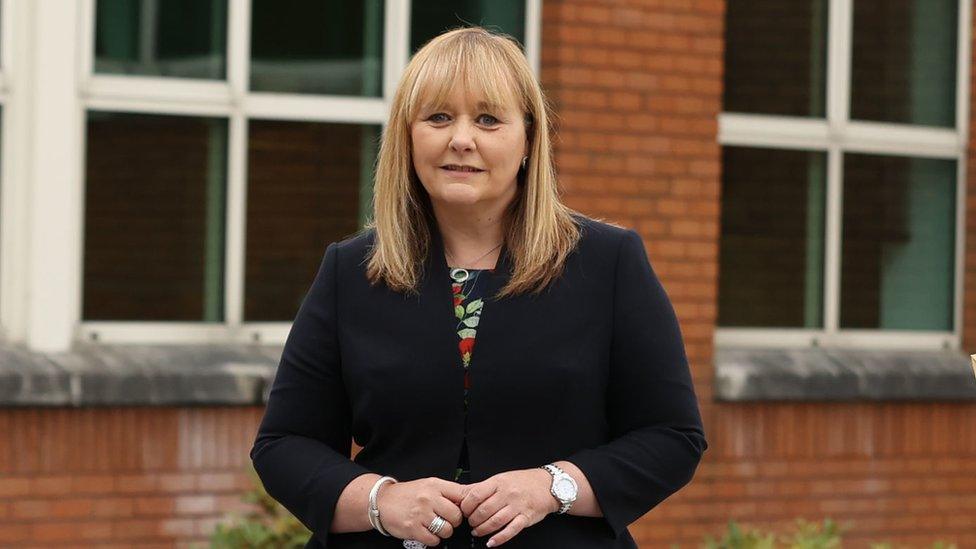Evangelical church school plan rejected by education minister
- Published

A plan by an evangelical church to open a voluntary grammar school has been rejected by the education minister.
The OneSchool Global network, established by the Plymouth Brethren Christian Church, was behind the plan.
It already runs two schools in Northern Ireland - in Newry, County Down, and Knockloughrim in County Londonderry.
It hoped to combine both schools as one post-primary, operating on two sites. OneSchool Global said it was "extremely disappointed" by the decision.
Michelle McIlveen turned down the proposal, although the existing schools for pupils of all school ages in Newry and Knockloughrim can continue to operate.
As independent schools, they are not currently funded by the Department of Education (DE), though if the proposal had been accepted that would have changed.
Parents of pupils currently pay fees of between £3,295 and £10,000 a year depending on how many children they have at the schools.
Principle of separation
The OneSchool Global network runs 23 schools across the UK and a number of others in the USA, Europe, the Caribbean and Australia.
It planned to combine its two existing schools into a school for 100 pupils aged 11-18, with one principal and one board of governors.
The Plymouth Brethren Christian Church dates back to 1827.
According to the church's core doctrine, believers regard the Old and New Testament "as being the inspired and infallible word of God".
They also practice the principle of separation - "drawing away from the world in a moral sense" - although communication and interaction with non-brethren is permitted.
Pupils in the Northern Ireland schools study subjects from the curriculum and sit qualifications like GCSEs, but the school ethos is based on the Plymouth Brethren Christian faith.
Some 68 pupils attended the Knockloughrim school in 2020/21 of which 42 were post-primary, while 26 post-primary pupils attended the Newry campus.
Some travel from the Republic of Ireland to attend the Newry school, while the Knockloughrim school attracts pupils from Belfast and Londonderry.
'Proposal asking for equality'
In a meeting with the former education minister, Peter Weir, in January 2021, representatives of OneSchool said they were bringing the plan forward for "the wider community of Christian parents and families, some - but not all - are members of the Plymouth Brethren Church".
"The proposal seeks to address the significant financial burden of providing these schools on the Brethren community - schools are non-selective, either on educational ability or financial wealth of the parents," an agreed note of the meeting said.
"It would see a benefit from the taxes that members of the community pay (part of which goes to DE) by receiving some funding from the government.
"The proposal is asking for equality in these areas.
"The school, while not inaccessible to all young people, will attract those who are from the faith community."

The final decision was down to the Education Minister Michelle McIlveen and she has now rejected the proposal
In a statement to BBC News NI, OneSchool Global Northern Ireland said: "Our latest inspection reports clearly recognise the value of the pastoral care in both of our campuses that allows our students to thrive, in addition to the high quality of teaching and learning that they receive.
"We will reflect on the detailed report provided by the Department of Education over the coming weeks and see how we can continue to learn from feedback provided."
The existing two schools are inspected by the Education and Training Inspectorate (ETI) and its teachers are registered with the General Teaching Council NI and paid according to DE salary scales.
But the ETI, Education Authority (EA) and Controlled Schools Support Council (CSSC) raised a number of concerns about the grammar school plan and did not support it.
Although the vast majority of grammar schools use academic selection tests, a voluntary grammar is ultimately defined by its management structure.
It is run by a board of governors who are the employers of staff, rather than employing authorities like the Council for Catholic Maintained Schools (CCMS) and the EA.
Related topics
- Published27 November 2019
